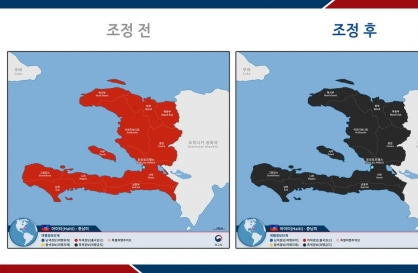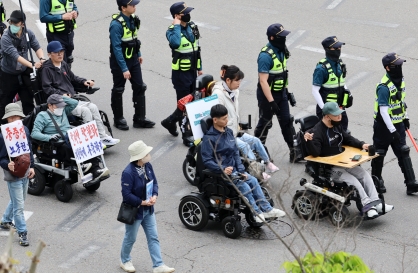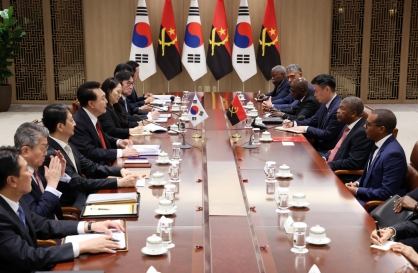An opposition lawmaker detonates a tear gas bomb at the rostrum of the National Assembly’s main chamber. Mobs in a nighttime rally beat up the Jongno police chief responsible for the public order of the heart of the capital. These two incidents related to protests against the Korea-U.S. free trade agreement demonstrate the state of lawlessness in the Republic of Korea.
The National Assembly makes law and police execute it. When some individuals use violence to deny these institutions’ authority with impunity, we cannot say this country is ruled by law. It is only a miracle that the nation’s government maintains stability and that people can trust it as they make their livings.
That lawmaker, Kim Sun-dong from the Democratic Labor Party, claims he did the right thing. His supporters compare him to patriots Ahn Jung-geun and Yun Bong-gil. The National Assembly Ethics Committee and the state prosecution have done nothing to punish him, although Assembly officials say his act violated as many as five statutes. A spokesman for the protesters at Gwanghwamun on Saturday night did not apologize but claimed the police chief deliberately provoked the attack by walking into the angry crowd.
Superintendent Park Geon-chan wanted to ask the leaders of five opposition parties and civic groups to end their illegal rally at the Gwanghwamun plaza, which was blocking traffic. Witnesses said he was immediately surrounded by about 100 protesters, some of whom beat him in the head, tore off his shoulder insignia, stripped him of his hat and broke his glasses.
A dozen officers pulled him out of the mob and the police group locked themselves up in the nearby Taepyeongno police box. Demonstrators followed them to the police box, calling the police chief “coward” and “traitor.” Some mistook him for National Police Agency head Cho Hyun-oh and called his name. The balance in power between lawbreakers and law enforcers was completely reversed.
There are the usual denunciations and vows of stern punishment after the event. Police spokespersons said that all those who joined in the attack would be arrested and brought to justice, and would also face civil damage suits. Blue House aides deplored the “challenge on state power.” They might fear that President Lee Myung-bak could face the same treatment if he were present there.
Over the last few decades, the nation has witnessed the retreat of authoritarian powers and the growth of civil society, but there also was a decline of the respect for law and state authority, as many misunderstood that the democratic system should tolerate such misbehavior. Police, the prosecution and even the court seemed to believe that the soft handling of lawbreakers was synonymous with neutral exercise of their authority.
Disputes among these institutions apparently helped weaken their own powers. The feud between police and prosecutors over the sharing of criminal investigation authority has reached the stage where police detectives surrendered their handcuffs in protest against what they believed was an unfair decision by the Prime Minister’s Office.
Many believe that the worsening dispute between law enforcement authorities is a symptom of a “lame duck” presidency. President Lee has got to prove that he is in charge. He is called upon to spend the rest of his term to keep the state in order summoning all administrative power given by the Constitution. He should by now regret that his mishandling of the candlelight vigil in 2008 virtually shackled his presidency.
The nation enters a volatile year with crucial elections ahead. Continuation of the current level of lawlessness will mean that anything can happen in 2012 at Gwanghwamun, in Yeoeuido or even in front of the Blue House. Actions to prevent disorder should start with giving the tear gas-using lawmaker and police-beating demonstrators what they deserve under our laws. If the authorities said something was intolerable, they should prove it was not tolerated any more.
We have the last appeal to those leaders of opposition parties to keep their protests within the legal limits. Saturday night, they were within several yards of the scene of the attack on the police chief. They cannot be allowed to avoid responsibility for the inexcusable incident.
The National Assembly makes law and police execute it. When some individuals use violence to deny these institutions’ authority with impunity, we cannot say this country is ruled by law. It is only a miracle that the nation’s government maintains stability and that people can trust it as they make their livings.
That lawmaker, Kim Sun-dong from the Democratic Labor Party, claims he did the right thing. His supporters compare him to patriots Ahn Jung-geun and Yun Bong-gil. The National Assembly Ethics Committee and the state prosecution have done nothing to punish him, although Assembly officials say his act violated as many as five statutes. A spokesman for the protesters at Gwanghwamun on Saturday night did not apologize but claimed the police chief deliberately provoked the attack by walking into the angry crowd.
Superintendent Park Geon-chan wanted to ask the leaders of five opposition parties and civic groups to end their illegal rally at the Gwanghwamun plaza, which was blocking traffic. Witnesses said he was immediately surrounded by about 100 protesters, some of whom beat him in the head, tore off his shoulder insignia, stripped him of his hat and broke his glasses.
A dozen officers pulled him out of the mob and the police group locked themselves up in the nearby Taepyeongno police box. Demonstrators followed them to the police box, calling the police chief “coward” and “traitor.” Some mistook him for National Police Agency head Cho Hyun-oh and called his name. The balance in power between lawbreakers and law enforcers was completely reversed.
There are the usual denunciations and vows of stern punishment after the event. Police spokespersons said that all those who joined in the attack would be arrested and brought to justice, and would also face civil damage suits. Blue House aides deplored the “challenge on state power.” They might fear that President Lee Myung-bak could face the same treatment if he were present there.
Over the last few decades, the nation has witnessed the retreat of authoritarian powers and the growth of civil society, but there also was a decline of the respect for law and state authority, as many misunderstood that the democratic system should tolerate such misbehavior. Police, the prosecution and even the court seemed to believe that the soft handling of lawbreakers was synonymous with neutral exercise of their authority.
Disputes among these institutions apparently helped weaken their own powers. The feud between police and prosecutors over the sharing of criminal investigation authority has reached the stage where police detectives surrendered their handcuffs in protest against what they believed was an unfair decision by the Prime Minister’s Office.
Many believe that the worsening dispute between law enforcement authorities is a symptom of a “lame duck” presidency. President Lee has got to prove that he is in charge. He is called upon to spend the rest of his term to keep the state in order summoning all administrative power given by the Constitution. He should by now regret that his mishandling of the candlelight vigil in 2008 virtually shackled his presidency.
The nation enters a volatile year with crucial elections ahead. Continuation of the current level of lawlessness will mean that anything can happen in 2012 at Gwanghwamun, in Yeoeuido or even in front of the Blue House. Actions to prevent disorder should start with giving the tear gas-using lawmaker and police-beating demonstrators what they deserve under our laws. If the authorities said something was intolerable, they should prove it was not tolerated any more.
We have the last appeal to those leaders of opposition parties to keep their protests within the legal limits. Saturday night, they were within several yards of the scene of the attack on the police chief. They cannot be allowed to avoid responsibility for the inexcusable incident.


















